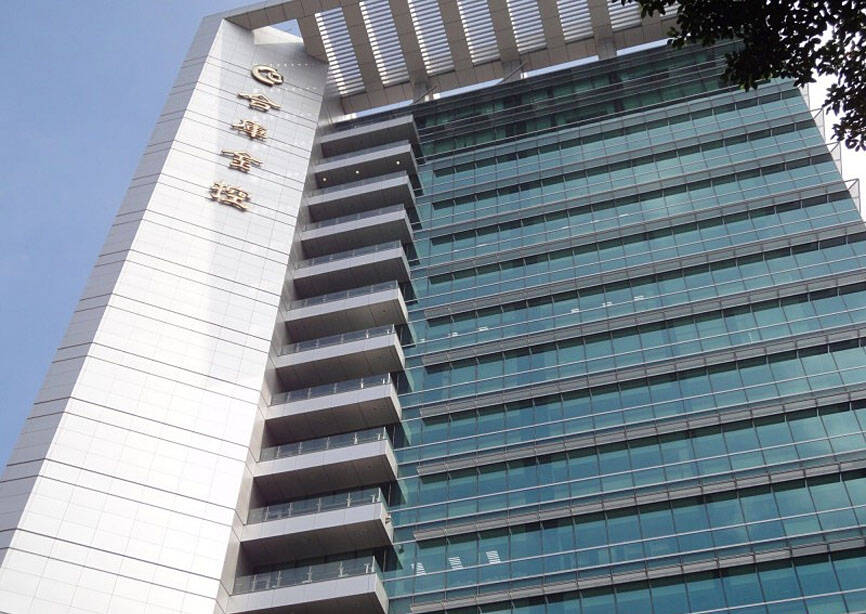State-run Taiwan Cooperative Financial Holding Co (合庫金控) yesterday said that it is looking at stable profit growth this year, as the improving economy at home and abroad would benefit core businesses and reverse loss-making overseas operations.
The bank-focused conglomerate gave the guidance during an online investors’ conference and said that economic scenes appear less murky, limiting the need for provisions.
Taiwan’s GDP growth this year is predicted to rise more than 3 percent, much faster than last year’s 1.32 percent.

Photo: Chen Mei-ying, Taipei Times
Net income last year totaled NT$17.88 billion (US$558.92 million), or earnings of NT$1.17 per share, company data showed.
The results represented declines of 14.12 percent and 15.22 percent from their levels in 2022, mainly due to provision costs for operations in Cambodia and elsewhere, Taiwan Cooperative Financial president Chen Mei-tsu (陳美足) said.
“Cambodia emerged from the pandemic in a slower-than-expected fashion,” prompting the lender to raise provision costs in the second and third quarters of last year to shore up its capital strength, officials said.
Things started to stabilize in the fourth quarter, when overseas operations squeezed a tiny profit, they said.
A string of rate hikes by the US Federal Reserve also pushed up funding costs more rapidly than the rise in interest income, officials added.
That explains why its main subsidiary, Taiwan Cooperative Bank (合作金庫銀行), last year saw its net income fall 14.95 percent to NT$16.3 billion, despite trading gains from financial products — including foreign exchange swaps — soaring nearly 200 percent.
Foreign exchange swaps generated more than NT$9 billion in profit, but might drop to NT$7.5 billion this year, they said.
This is due to Taiwan’s central bank last week unexpectedly raising interest rates by 0.125 percentage points and given that the US Federal Reserve might lower rates to support the US economy, officials added.
The narrowing difference between the interest rates of Taiwan and the US is unfavorable for swap revenue, officials said.
Even without the provision costs, Taiwan Cooperative Financial would record a net income increase of almost 20 percent, indicating that core businesses remain healthy, Chen said.
High funding costs also affected the results of Taiwan Cooperative Securities Co Ltd (合庫證券) and Taiwan Cooperative Bills Finance Corp (合庫票券), officials said.
In contrast, its venture capital and life insurance units saw robust improvement in their earnings ability, they added.
Taiwan Cooperative Financial said it plans to distribute a cash dividend of NT$0.65 per share and another stock dividend of NT$0.35 from last year’s net income, suggesting a payout ratio of 85 percent.
The plan is still pending approval from a shareholders’ meeting later this year.

MULTIFACETED: A task force has analyzed possible scenarios and created responses to assist domestic industries in dealing with US tariffs, the economics minister said The Executive Yuan is tomorrow to announce countermeasures to US President Donald Trump’s planned reciprocal tariffs, although the details of the plan would not be made public until Monday next week, Minister of Economic Affairs J.W. Kuo (郭智輝) said yesterday. The Cabinet established an economic and trade task force in November last year to deal with US trade and tariff related issues, Kuo told reporters outside the legislature in Taipei. The task force has been analyzing and evaluating all kinds of scenarios to identify suitable responses and determine how best to assist domestic industries in managing the effects of Trump’s tariffs, he

TIGHT-LIPPED: UMC said it had no merger plans at the moment, after Nikkei Asia reported that the firm and GlobalFoundries were considering restarting merger talks United Microelectronics Corp (UMC, 聯電), the world’s No. 4 contract chipmaker, yesterday launched a new US$5 billion 12-inch chip factory in Singapore as part of its latest effort to diversify its manufacturing footprint amid growing geopolitical risks. The new factory, adjacent to UMC’s existing Singapore fab in the Pasir Res Wafer Fab Park, is scheduled to enter volume production next year, utilizing mature 22-nanometer and 28-nanometer process technologies, UMC said in a statement. The company plans to invest US$5 billion during the first phase of the new fab, which would have an installed capacity of 30,000 12-inch wafers per month, it said. The

Taiwan’s official purchasing managers’ index (PMI) last month rose 0.2 percentage points to 54.2, in a second consecutive month of expansion, thanks to front-loading demand intended to avoid potential US tariff hikes, the Chung-Hua Institution for Economic Research (CIER, 中華經濟研究院) said yesterday. While short-term demand appeared robust, uncertainties rose due to US President Donald Trump’s unpredictable trade policy, CIER president Lien Hsien-ming (連賢明) told a news conference in Taipei. Taiwan’s economy this year would be characterized by high-level fluctuations and the volatility would be wilder than most expect, Lien said Demand for electronics, particularly semiconductors, continues to benefit from US technology giants’ effort

‘SWASTICAR’: Tesla CEO Elon Musk’s close association with Donald Trump has prompted opponents to brand him a ‘Nazi’ and resulted in a dramatic drop in sales Demonstrators descended on Tesla Inc dealerships across the US, and in Europe and Canada on Saturday to protest company chief Elon Musk, who has amassed extraordinary power as a top adviser to US President Donald Trump. Waving signs with messages such as “Musk is stealing our money” and “Reclaim our country,” the protests largely took place peacefully following fiery episodes of vandalism on Tesla vehicles, dealerships and other facilities in recent weeks that US officials have denounced as terrorism. Hundreds rallied on Saturday outside the Tesla dealership in Manhattan. Some blasted Musk, the world’s richest man, while others demanded the shuttering of his